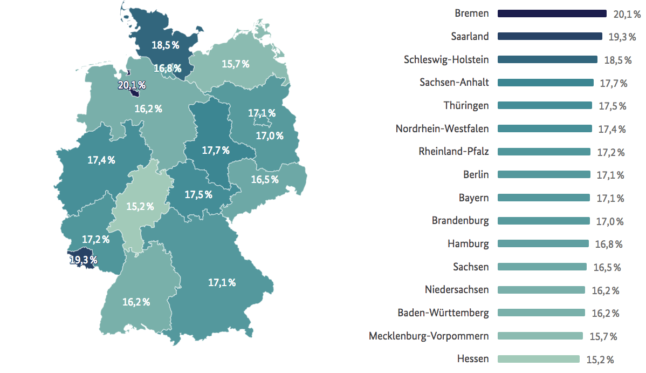It means around a fifth of all Bremen residents – that’s around 20.1 percent or 137,000 people – have received at least one jab in the inoculation campaign. Nationwide, the figure is 16.9 percent.
The northern city-state of Bremen, which has around 569,350 people, is the top performing state when it comes to vaccinations in Germany.
The vaccination dashboard shows a map and the percentage of residents who have received at least one dose. Saarland follows closely behind Bremen, after giving around 19.3 percent of people at least one jab.
READ ALSO: ‘I finally might be able to go home’: What it’s like to be offered the Covid vaccine in Germany
Bremen has fully vaccinated around 6.4 percent of the population. When it comes to residents who’ve received both doses, Thuringia is at the top of the list with 7.5 percent.
About 6.2 percent of the population in Germany is fully inoculated.

So how is Bremen doing it?
According to authorities there, a team effort combined with carrying out vaccinations seven days a week is contributing to the speed of the rollout.
Bremen’s mayor Andreas Bovenschulte, of the Social Democrats (SPD), said that a “likely unprecedented alliance” made up of the Senate, aid organisations and the private sector had been set up for the vaccination centre in Bremen.
“This is unique in Germany,” said Bovenschulte. “We vaccinate seven days a week, even on holidays.”
Bovenschulte said the city could even give out more injections if even more doses were delivered.
Bremen has “administered well over 90 percent of the vaccine supplied to us,” said health senator Claudia Bernhard (Left Party).
Germany has lagged behind several other countries including the UK and the US due in part to EU-wide supply issues, regional bureaucratic hurdles and problems with AstraZeneca.
But the country has been gradually picking up speed as vaccines supplies get delivered, and more GPs start vaccinating.
More than 656,000 shots were administered last Wednesday – a record daily amount. And that was followed on Thursday with 719,927 shots – another record. On Tuesday April 13th, around 530,500 shots were administered in Germany.
It is hoped that Johnson & Johnson’s delay to the rollout of its single-dose vaccine in Europe, which came about after US officials urged for a pause on administering the jab on Tuesday, doesn’t cause major problems for EU countries.



 Please whitelist us to continue reading.
Please whitelist us to continue reading.
Member comments